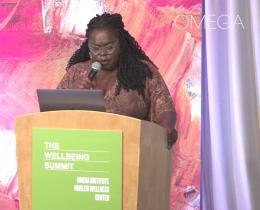At the Omega Women’s Leadership Center (OWLC), part of our work is to cultivate an informed awareness, historic memory, and global understanding of the intersectional context and experiences of women’s and girls’ lives. We are anguished by the grave risk to life, liberty, and justice caused by Supreme Court's decision to overturn the constitutional right to abortion and believe it must be understood within the historical and persistent context of patriarchy, which has shaped human relationships around the world for the past several thousand years.
While patriarchy is primarily about gender, its deeper force is about dominance—dominance of one group over another, and of people over nature. And even though male dominance has been the primary mechanism of patriarchy, men and boys and people across the gender spectrum also suffer from its impact. Over the past several hundred years, there has been a growing effort, across social movements, to bring this historical period of dominance to an end and usher in a new era centered on a human ethic of living cooperatively on our precious planet and building a global culture of care, compassion, and connection.
It is critical to remember the dangerous and unjust conditions for women that existed prior to Roe v. Wade, and also take into account what we know from other countries where abortion is currently illegal. Forcing someone to bear a child against their will creates undue danger, tremendous suffering, cruelty, and loss of life. Often those who seek abortions are already parents, and their suffering then extends to their children and families. Bearing, nurturing, and raising a child is one of the most sacred of human acts for those who choose it. We believe those facing this most intimate and private decision have the inherent spiritual and moral authority to do so informed by their beliefs, life circumstances, community, and advice of health care providers—and this must be reflected in legal authority.
By undoing the constitutional right to privacy, the court is stripping away the capacity of women and all people whose reproductive autonomy is now threatened—particularly women of color, the LGBTQIA+ community, those without access to resources, and those suffering from domestic violence—to have control over bodily autonomy, and to participate fully in our education, economic, cultural, religious, and political institutions. This creates a tragic and decisive step backward from the progress we have made and sets the legal precedent for overturning many other legal advances towards building a pluralistic, inclusive, and democratic society. It is also shamefully out of step with the will of the majority of people in the United States and the growing legalization of abortion in other countries around the world.
We are holding the complex tension between our aspiration for building greater cooperation within our human family and taking a public position that we know is polarizing. In 2005, Omega convened a panel discussion at our Women & Power conference in partnership with the Public Conversations Project, featuring women from both sides of the abortion issue who began meeting regularly with the shared goal of reducing violence resulting from this issue. They were committed to using the dialogue process to broaden perspectives, deepen understanding, and prevent violent extremism so that “no person would ever be harmed by the dehumanizing effects of dysfunctional public discourse.”
Sadly, almost 20 years later, we are at what feels like for many, an unbridgeable breach across beliefs, party lines and even around dinner tables. To act in alignment with our vision and values means to both fully engage in advocating strenuously for laws that protect our fundamental civil and human rights, and at the same time, to play an active role in civic dialogue to increase tolerance, deescalate polarization, foster human connection, and resolve conflicts peacefully.
We continue to support the dialogue practices presented by the Public Conversations Project so many years ago, and the dialogue work of our partner Living Room Conversations, and others committed to increased understanding through building relationships. For those interested in being advocates for change, we encourage you to participate fully in the democratic process by getting informed, and connecting with efforts and organizations working on this issue. Together, we can work toward a country that fully values reproductive rights and justice for everyone, and the lives of women and girls everywhere.



